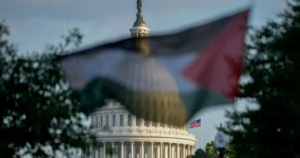Yet against this backdrop, last week stood out sharply, as Trump ignited a fierce international trade war, slapped tariffs on trading partners, and triggered a global market meltdown, including on his prized Wall Street, where hundreds of billions of dollars in stock values vanished.
With apprehensive eyes fixed on Monday’s markets and fears of recession escalating, JP Morgan analysts recently increased their forecast for a global economic downturn to 60%, while Americans prepare for the return of inflation—the principal undoing of Trump’s predecessor, Joe Biden.
Trump, however, remained unfazed by market downturns and global political censure, including rare critiques from within his own Republican party, asserting that now is a “great time to enrich oneself” and that “China miscalculated – they panicked.”
Panic also gripped some segments of the US population, such as sisters Kathleen and Elizabeth from Detroit, who expressed their apprehensions and worries over the administration’s leadership and abrupt policy shifts without clear strategies.
In contrast, financier Leo Ezekiel, 39, harbored a divergent view. He was less concerned about stock market fluctuations, considering it a natural ebb and flow of the market—a routine in the American economic scene.
Trump’s tariff move was driven by a vision of reviving American manufacturing dominance, a goal most economists consider a low likelihood. His decision came after considering retaliatory measures from America’s largest trading partners, including Mexico, China, and the European Union.
The White House orchestrated the tariff announcement as a significant event, with Trump portraying the tariffs as a remedy to decades of detrimental trade deals, promising to shift the balance and bring prosperity back to the US workforce.
While America’s trade allies were far from enamored with the move, world leaders like British PM Keir Starmer hinted at potential retaliation, signaling a shift towards a new economic era.
The full impact of Trump’s tariffs remains uncertain, with questions looming over whether they mark a course towards economic self-damage, a tactical negotiation strategy, or a genuine attempt to redefine US trade policies.
after newsletter promotion
With the tariffs set to take effect next week, early repercussions were already visible. The cost of importing goods from China to the US had reportedly surged by 40% in one month, and a Canadian car factory had already ceased operations.
On Friday, Jerome Powell, the chair of the Federal Reserve, warned that Trump’s actions risked fuelling higher inflation and slower growth. The president remained undeterred by adverse media coverage and criticism from overseas leaders, seemingly focused on cementing his political legacy.
“He’s reached a point where he doesn’t give a damn anymore,” a White House insider told the press. “Negative headlines? Doesn’t care. He’s committed to fulfilling his campaign promises, regardless of the fallout.”
However, some former Trump economic advisors privately doubted the feasibility of achieving manufacturing self-sufficiency, a goal seen by many as improbable.
Michael Wolff, who has written extensively about Trump, suggests that the president is closely monitoring the repercussions of his actions on global trade. Wolff posits that Trump’s dual instincts could lead to mixed outcomes; while he may be pleased to dominate the news cycle and underscore tariffs’ importance, he’s also likely to keep a wary eye on the financial markets and the flak from business leaders.
“It’s a double-edged sword for him,” Wolff points out. “He’s at the forefront of the news again, but it could also backfire.” That volatility, Wolff asserts, is the essence of Trump – the spark of self-destruction that paradoxically keeps him in the spotlight.
Source: https://www.theguardian.com/us-news/2025/apr/06/trump-tariffs-american-era-uncertainty








